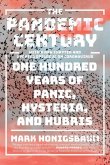During 2020, Brazil has emerged as one of the worst-hit countries by the Coronavirus pandemic. In order to understand the impact of the COVID-19 this comprehensive volume of more than 120 research-based articles, navigates the origin, spread, response and containment of the COVID-19 virus by the Brazilian government. This excellent volume of work is intended to serve as a reference book for researchers with an interest in the Brazilian COVID-19 crisis. This work begins by examining how the virus was initially brought into Brazil by the wealthy elite, and how the virus predominantly affected the country's poor, thus exposing structural inequalities such as class, race and ethnicity. Furthermore, this collection highlights the multiple challenges faced by the Brazilian population and public health authorities concerning arbovirus infections, including the occurrence of concurrent epidemics like the COVID-19 pandemic and strategies to mitigate the effects for high risk and vulnerable populations. Despite the risks associated with COVID-19 academic contributors to this book, describe President Jair Bolsonaro, as the leader of the Brazilian "coronavirus-denial movement" against science and evidence-based recommendations, which mitigate against COVID-19, such as mask wearing, social distancing, lockdowns. Instead, Bolsonaro prefers to promote unproven medicines as a viable solution to the pandemic. Evidence of mental distress and its associated predictors among adults during the pandemic are presented by psychologists, who assert that mental health issues have led to higher than expected levels of domestic violence and substance abuse. In respect of educational issues, authors imply that the closure of schools has led to malnutrition, as children miss school-provided meals, leading to higher dropout rates, thus adding to the already high unemployment levels among Brazilian youth. The latter part of this volume demonstrates s how the COVID-19 pandemic has exacerbated food insecurity and affordability issues due to increasing food production and distribution costs. While the Brazilian government continues to prioritize the economy over health, this book makes it clear that every aspect of Brazilian life, will continue to be affected by this pandemic, until a vaccine is developed to counter the increasing number of COVID related cases and deaths. Until then, the Brazilian catastrophe will continue unabated.








